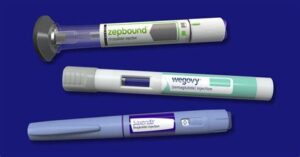By Adrian Manz | TraderInsight.com
The global weight-loss drug market—dominated by U.S. giants Eli Lilly and Novo Nordisk—is facing a potential shake-up, and traders should take note.
On Tuesday morning, Jiangsu-based Hengrui Pharma and its U.S. partner Kailera Therapeutics announced promising late-stage trial results for their injectable weight-loss drug HRS9531, with average patient weight loss of 18% over 48 weeks, and 19% among trial completers. For context, Lilly’s blockbuster Zepbound (tirzepatide) delivered 21% weight loss in a longer-duration trial. But here’s the catch: Hengrui’s study ended before patients reached a weight loss plateau, and the highest tested dose hasn’t even been evaluated yet.
While this news won’t unseat Zepbound’s market dominance overnight, it signals something far more important for market participants: the rise of Chinese biotech as a competitive global force.
💡 Trading Implications
Here are the key takeaways for active investors and traders:
1. U.S. Biotech May Lose Its Innovation Moat
The weight-loss market is one of the largest and fastest-growing segments in global healthcare. Lilly and Novo have enjoyed outsized valuations fueled by first-mover advantages in GLP-1 therapies. But Hengrui’s data shows that Chinese companies are closing the innovation gap—and fast. Kailera is now preparing to run global trials to pursue broader approvals.
2. Chinese Innovation, American Distribution
Kailera Therapeutics—a U.S.-based company launched just last October with $400 million in private capital—holds exclusive rights outside China to HRS9531. That includes the U.S. market. Interestingly, Kailera’s chief commercial officer is a former brand leader for Zepbound at Lilly, positioning the startup with deep domain experience in the space.
3. GLP-1/GIP Agonist Arms Race
Kailera’s HRS9531 is a dual GLP-1/GIP receptor agonist, just like Zepbound. Earlier trials even showed 22.8% weight loss at higher doses—potentially exceeding Zepbound’s performance. With investors already pricing in sky-high expectations for Lilly and Novo, any credible threat to their IP dominance could shift valuations quickly.
4. Surge in U.S. Licensing Deals
This news comes amid a flurry of recent licensing deals between Chinese biotechs and U.S. pharma giants. Merck paid $112 million up front to license an oral GLP-1 from Hansoh Pharma. Regeneron followed with an $80 million deal. Even legacy players like AstraZeneca are getting in on the action.
💬 The implication? U.S. Big Pharma is increasingly outsourcing innovation to China. The trend could either erode U.S. biotech independence or enhance efficiency and global collaboration.
📊 What Traders Should Watch
-
Eli Lilly (LLY) – Shares fell 3.45% on Tuesday, possibly reacting to the Hengrui trial results and broader profit-taking. Watch for technical support near recent breakout levels.
-
Novo Nordisk (NVO) – Though less directly impacted, increased competitive pressure could weigh on sentiment.
-
Chinese biopharma ETFs – These may start to see inflows if investor sentiment turns toward high-growth Chinese R&D.
-
U.S. small/mid-cap biotech – Could lose out on capital if Big Pharma prioritizes Chinese partnerships.
🧠 Final Word
While HRS9531 is still years away from U.S. approval, this news highlights a paradigm shift. Chinese biotech firms are no longer just contract manufacturers or generic competitors—they’re front-line innovators with the potential to disrupt global markets.
Traders and investors should expect volatility, sector rotation, and opportunity as the global obesity drug war heats up. The question isn’t just who has the best drug today—but who can deliver next-generation therapies tomorrow.
Stay focused. Stay informed. And as always, trade what’s in front of you.
—
🔗 Watch the latest market recap: TraderInsight.com/war-room-trading-recap
🔴 Join our next live session: TraderInsight.com/live-stream

